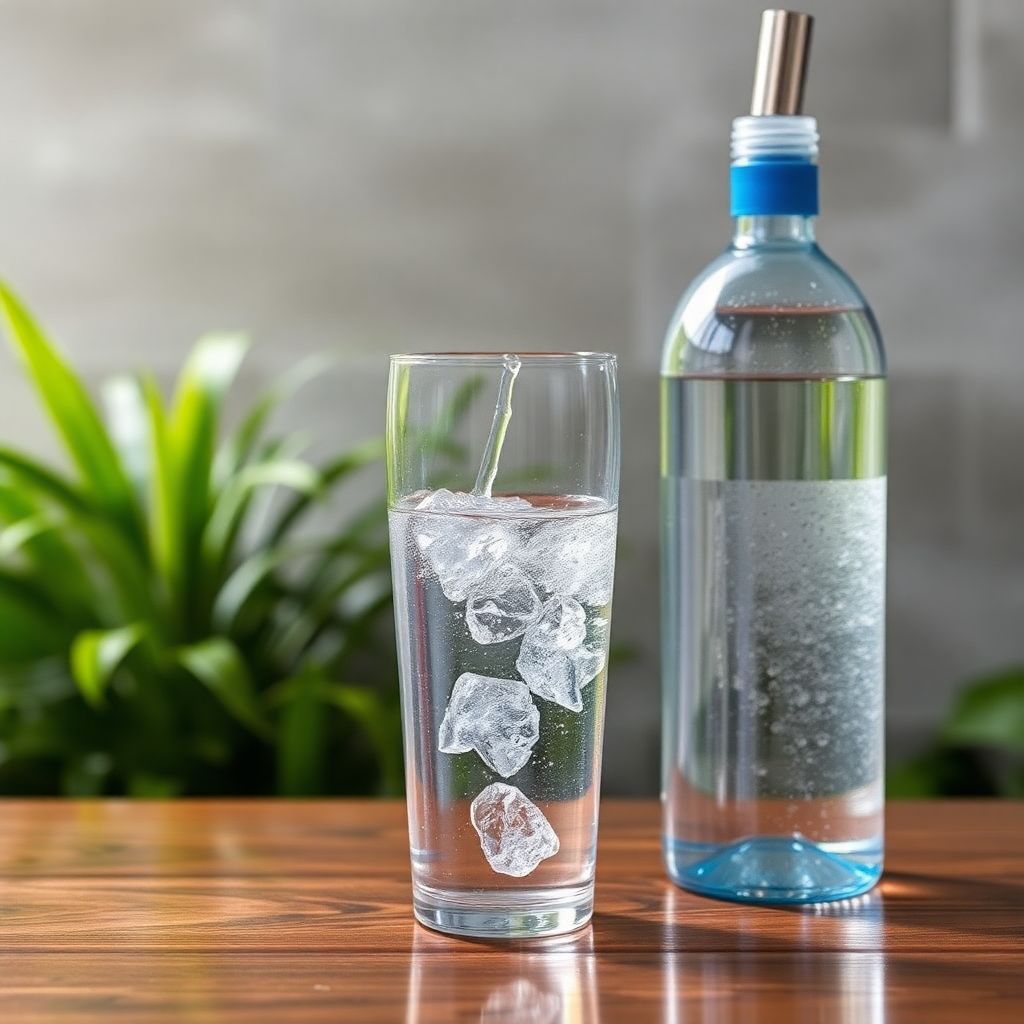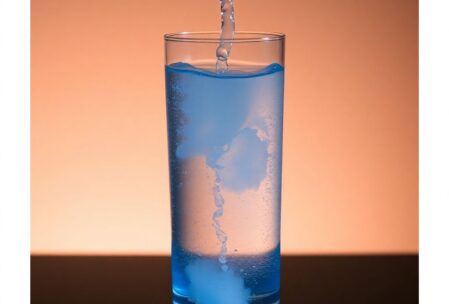
Table of Contents
As a health researcher and enthusiast, I’ve been fascinated by the recent buzz surrounding hydrogen water. This trendy beverage claims to offer a range of health benefits, from boosting athletic performance to slowing down aging.
But can it really live up to the hype and replace our trusty H2O?
Here’s the science behind hydrogen water and explore it’s potential to change hydration.
>>Click here to find the best hydrogen water bottles<<
Understanding Hydrogen Water
Hydrogen water is created by dissolving molecular hydrogen (H2) gas into regular water. This process doesn’t alter the chemical structure of water (H2O) but adds extra hydrogen molecules that can be absorbed by the body.
The key to hydrogen water’s potential benefits comes from it’s unique properties as a selective antioxidant.
Unlike traditional antioxidants that neutralize all free radicals indiscriminately, hydrogen targets only the most harmful ones, such as hydroxyl radicals. This selectivity is crucial because some free radicals play important roles in cell signaling and other bodily functions.
By targeting only the harmful free radicals, hydrogen water potentially offers antioxidant benefits without disrupting essential cellular processes.

Potential Benefits of Hydrogen Water
Research suggests that hydrogen water may have a wide range of positive effects on the body. Here are some of the potential benefits that have been observed in various studies:
1. Enhanced Athletic Performance
A 2017 study published in the Journal of Sports Medicine and Physical Fitness found that athletes who consumed hydrogen water experienced less muscle fatigue and faster recovery times after intense exercise. This could be particularly useful for endurance athletes or those engaging in high-intensity training.
2. Reduced Inflammation
Chronic inflammation is linked to many health issues, including heart disease, diabetes, and certain cancers. Some studies have shown that hydrogen water may help reduce inflammation markers in the body, potentially offering protection against these conditions.
3. Improved Cognitive Function
A 2019 study published in Scientific Reports demonstrated improved cognitive function in elderly women with mild cognitive impairment after drinking hydrogen water regularly.
This suggests that hydrogen water could potentially play a role in maintaining brain health as we age.
4. Potential Therapeutic Effects
Some research has indicated that hydrogen water may have therapeutic effects on various health conditions, including metabolic syndrome, cardiovascular disease, and certain neurological disorders. However, more extensive clinical trials are needed to confirm these potential benefits.
The Science Behind Hydrogen Water
To understand how hydrogen water might offer these benefits, we need to look at it’s molecular properties.
Hydrogen is the smallest and lightest element, allowing it to easily penetrate cell membranes and even cross the blood-brain barrier.
This unique characteristic enables hydrogen to reach parts of the body that other antioxidants might not be able to access.
When hydrogen molecules enter our cells, they can neutralize harmful free radicals, particularly the hydroxyl radical, which is considered one of the most reactive and damaging to our DNA and cellular structures.
By reducing oxidative stress at the cellular level, hydrogen water may help protect our bodies from various forms of damage and potentially slow down the aging process.
Also, hydrogen has been shown to activate certain cellular pathways that are associated with stress response and longevity.
For example, it may stimulate the Nrf2 pathway, which regulates the expression of antioxidant proteins that protect against oxidative damage triggered by injury and inflammation.
Challenges and Limitations
While the potential benefits of hydrogen water are exciting, it’s important to approach the topic with a critical eye. Much of the research on hydrogen water is still in it’s early stages, with many studies conducted on small sample sizes or animal models.
We need more extensive human clinical trials to fully understand the long-term effects and potential benefits of hydrogen water consumption.
One of the biggest challenges with hydrogen water is it’s stability. The extra hydrogen molecules tend to dissipate quickly, with a half-life of about 2-3 hours in open containers.
This has led to the development of various technologies for hydrogen water production and storage, including electrolysis machines, hydrogen tablets, and specialized bottles designed to maintain hydrogen concentration.
These solutions, while innovative, bring up another important consideration – cost and environmental impact. Hydrogen water is significantly more expensive than tap water or regular bottled water.
The energy required for production and the potential increase in plastic waste from specialized bottles are also factors to consider in our increasingly eco-conscious world.
Can Hydrogen Water Replace Regular Water?
Despite it’s potential benefits, hydrogen water cannot entirely replace regular water. Regular water is essential for basic hydration and countless bodily functions.
It’s the foundation of life as we know it.
Hydrogen water should be viewed as a potential supplement as opposed to a finish replacement for regular water.
Think of it this way: regular water is your reliable, everyday vehicle that gets you where you need to go. Hydrogen water, on the other hand, is like a high-performance sports car.
It might offer some extra benefits, but it’s not necessarily what you need for your daily commute.
Incorporating Hydrogen Water into Your Routine
If you’re interested in trying hydrogen water, here are some practical tips for incorporating it into your lifestyle:
- Start small: Begin by adding hydrogen water to your routine a few times a week as opposed to completely replacing regular water.
- Invest in a reusable hydrogen water bottle: This can help reduce plastic waste and allow you to create hydrogen water on-the-go.
- Consider hydrogen tablets: These can be a more cost-effective and portable option compared to pre-bottled hydrogen water.
- Time your consumption: Since the hydrogen dissipates over time, try to consume the water shortly after it’s been infused for most potential benefits.
- Don’t neglect regular water: Remember that hydrogen water is a supplement, not a replacement.
Ensure you’re still getting plenty of regular water throughout the day.
The Future of Hydrogen Water Research
As interest in hydrogen water grows, we can expect to see more research conducted in this field. Future studies may focus on:
- Long-term effects: Investigating the impact of regular hydrogen water consumption over extended periods.
- Specific health conditions: Exploring the potential therapeutic effects of hydrogen water on various diseases and disorders.
- Optimal dosage: Determining the ideal amount of hydrogen water for different health goals and populations.
- Delivery methods: Developing more effective and environmentally friendly ways to produce and store hydrogen water.
- Combination with other therapies: Examining how hydrogen water might complement existing treatments or lifestyle interventions.
Frequently Asked Questions
What is hydrogen water?

Hydrogen water is regular water that has been infused with additional hydrogen molecules. It’s created by dissolving molecular hydrogen gas into water, which doesn’t change the water’s chemical structure but adds extra hydrogen that can be absorbed by the body.
How does hydrogen water differ from regular water?
The main difference is the presence of additional dissolved hydrogen molecules. Regular water (H2O) consists of two hydrogen atoms bonded to one oxygen atom.
Hydrogen water contains these same H2O molecules plus extra hydrogen molecules (H2) dissolved in the water.
What are the potential benefits of drinking hydrogen water?
Some potential benefits suggested by early research include improved athletic performance, reduced inflammation, enhanced cognitive function, and possible therapeutic effects on various health conditions. However, more extensive studies are needed to confirm these benefits.
Is hydrogen water safe to drink?
Current research suggests that hydrogen water is safe for consumption. Hydrogen is a natural component of water and is not known to have any toxic effects when consumed in the amounts typically found in hydrogen water.
How often should I drink hydrogen water?
There’s no established guideline for hydrogen water consumption. Some studies have shown benefits with daily consumption, while others have used it periodically.
It’s best to start with small amounts and ask with a healthcare professional if you have any concerns.
Can hydrogen water help with fat loss?
While some preliminary studies have suggested that hydrogen water might influence metabolism, there’s not enough evidence to claim it as a weight loss aid. A balanced diet and regular exercise stay the most effective strategies for weight management.
Does hydrogen water taste different from regular water?
Most people report that hydrogen water tastes similar to regular water. Some say it has a slightly sweeter or smoother taste, but the difference is usually subtle.
How long does hydrogen water stay effective?
The additional hydrogen in hydrogen water tends to dissipate quickly, with a half-life of about 2-3 hours in open containers. It’s best to consume hydrogen water soon after it’s been prepared or opened for most potential benefits.
Can I make hydrogen water at home?
Yes, there are various methods to make hydrogen water at home, including using hydrogen water machines, hydrogen tablets, or specialized bottles designed to generate hydrogen water. However, the effectiveness of these methods can vary.
Is hydrogen water more hydrating than regular water?
There’s no conclusive evidence that hydrogen water is more hydrating than regular water. Both types of water will contribute to your daily hydration needs.
The potential benefits of hydrogen water are related to it’s antioxidant properties as opposed to enhanced hydration.
Conclusion
Hydrogen water represents an exciting frontier in nutrition and health research. While it shows promise in various areas of wellness, it’s not quite ready to replace regular water as our primary source of hydration.
Instead, it’s best viewed as a potential tool in your health arsenal – one that may offer some extra benefits but shouldn’t replace the fundamentals of good hydration and a healthy lifestyle.
As research continues, hydrogen water stays an intriguing area of study in the fields of nutrition, medicine, and public health.
In the future, we may uncover even more about this molecular marvel and it’s potential to enhance our health and well-being.
Key Takeaways
- Hydrogen water contains dissolved molecular hydrogen, which acts as a selective antioxidant.
- Early research suggests potential benefits in athletic performance, inflammation reduction, and cognitive function.
- More extensive human clinical trials are needed to fully understand the long-term effects and benefits.
- Hydrogen water should be viewed as a supplement, not a replacement for regular water.
- Consider the cost and environmental impact when incorporating hydrogen water into your routine.
>>Click here to find the best hydrogen water bottles<<
Resource
Hydrogen Water Case Studies and Clinical Trials
This post contains affiliate links, which means I may earn a commission if you click through and make a purchase at no additional cost to you.